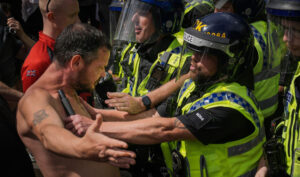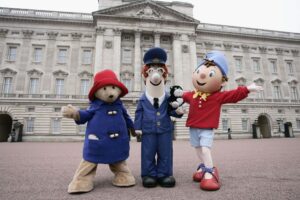According to Jacob Rees-Mogg’s housekeeper her employer “likes it quite stiff”. It turns out she’s talking about the starched crease on his boxer shorts but it might as well have been his attitude to the proverbial upper lip.
We learn just how stiff in Meet the Rees-Moggs — arriving onscreen next week — as strangers shout aggressively at the infamous politician as he crosses the road or buys his daily chocolate éclair from Greggs. In return, they invariably get a polite “thank you!” and an awkward little wave. In the run-up to July’s General Election, someone writes “POSH TWAT” in marker pen on a Vote Conservative sign outside his mother’s house. With insistent amusement, Rees-Mogg jokes to his family that the culprit must be “very easy to spot”: “an angry socialist giant who has a very vulgar knowledge of language”.
The man seems absolutely determined not to take anything personally, ever. And his loyal wife Helena is equally stoic, sporting the sort of highborn expressionlessness and barely moving mouth that the lower classes can only hope to achieve with Botox. “Other careers are available,” she murmurs to two of the couple’s six children after warning them about their father’s impending election defeat, after 14 years as an MP. Later, she tells the camera resolutely: “As Churchill said, KBO.”
But just why do people detest her husband so much? In the past, protestors have thrown bottles at him. Random passers-by have told his children that their father is a “horrible person” and that “lots of people hate him”. For the second year running, he appears on The New European “shit list” — out this week — dedicated to rooting out “the sneaky, the snobbish, and the snide”. Indeed, the new TV series is predicated on the idea that Rees-Mogg is “one of the most divisive politicians in Britain”, as stated in the title sequence.
Yet the first two programmes do nothing much to explain the animosity. Instead we get a Great British Bake Off-style portrait of an amusingly donnish oddball, complete with an arch-sounding pizzicato soundtrack in case we didn’t already get the point. In the interactions we see between Rees-Mogg and others, it’s as if half his mind is whirling away on some other thing entirely. When Jacob was first courting Helena, she tells us, she couldn’t think of much else. He, meanwhile, was gazing lovingly into his wife-to-be’s eyes and seeing her ancestor Thomas Wentworth the 1st Earl of Strafford, by far and away his favourite adviser to King Charles I.
We also get to see Catholic Jacob in his own private chapel, rhyming “Mass” with “arse” and showing off his reliquary, which includes a bit of Thomas More’s hair shirt. There’s a scene with the whole family dressed in black tie at the dinner table, three small boys included. And then there’s Jacob inadvertently giving the lie to Conservative fears about what’s bound to happen under a nanny state, as his own ever-indulgent nanny Veronica lets him off from eating his vegetables. Now ancient, she is filmed ministering to young Alfred, Anselm, and Sixtus the sixth and last — each of them approaching the Platonic form of the adorably naughty schoolboy — while the elder three Rees-Moggs are off at boarding school.
The puzzling question remains. It can’t just be all the money, the stately home, or the languid drawling that people object to, nor even the rampantly Right-wing views; such things are hardly scarce in the Tory party at large. One determined critic in the first episode says that Rees-Mogg “seems to despise people who are poorer than him”. Yet, on the contrary, all the evidence of the documentary suggests he approaches everyone, rich or poor — including, for that matter, his own wife and children — in exactly the same way. Namely: as if he is forcing himself into social interactions for the sake of some higher purpose.
Another explanation for the degree of opprobrium to such a relentlessly mild and amiable man is the perception that the whole Honourable-Member-for-the-18th-Century act is a put on. Perhaps revealing a little too clearly their own snobbishness, writers at The New European this week called Rees-Mogg a “fake aristo”. Likewise, in 2017, Polly Toynbee wrote that he was “about as authentic as that Downton Abbey shot where they left a plastic bottle on the mantlepiece”. In Nancy Mitfordesque vein, The Guardian columnist continued: “The double-breasted posh-speak, Latin tags and ludicrous names for his six children are all pastiche panache, a country house charade.”
But again, I don’t think so — or at least, not if you believe Michael Ashcroft in his admittedly sympathetic biography Jacob’s Ladder. For one, though Rees-Mogg is indeed not an aristocrat nor ever claimed to be, sexist Toynbee seems to be ignoring the clear influence of his impeccably pedigreed wife upon the family lifestyle (full name Helena Anne Beatrix Wentworth Fitzwilliam de Chair). For another, schoolfriend after schoolfriend lines up to tell Ashcroft that, as a youth, Jacob was just as fogeyish, money-obsessed, and downright strange as he is now.
Says one old pal, recalling eight-year old Jacob: “He used to sit behind me and read The Financial Times.” As an 11-year-old shareholder, young Rees-Mogg attended the Lonhro AGM, quizzing directors from the floor about their plans to buy The Observer. At Eton, he declared the dropping of the tailcoat requirement on very hot days an “unnecessary slacking of regulations”, refusing to follow the trend. And a friend recounts that, at Oxford, he “was bullied unmercifully by people who took the piss out of him because he was such an anomaly, even among his own class”.
Futilely contesting the seat of Central Fife for the Tories in the 1997 General Election, including several former coal mining towns in which unemployment was rife, Rees-Mogg was viewed as a “figure of complete ridicule” according to onlookers but remained unbowed. “I’ve worn a suit every day since I was 14,” he told The Scotsman. “I’m not about to change now.” He also told reporters, without any apparent sense of foreboding, that Veronica the nanny would be coming up North to help him campaign.
No, I think the real reason people hate Rees-Mogg is not that he is fake, but quite the opposite: he is authentic, clear-eyed and apparently unashamed about who he is and what he believes. Ironically, while “bringing your whole self to work” is something we’re all supposed to be doing these days, the example of Rees-Mogg shows us the pitfalls when someone actually does it.
Not for him, hints of apologetic embarrassment about the reactionary principles he would prefer not to hold. He is calmly candid about them, without even a defiant compensatory swagger à la Truss or Jenrick. And nor do we get the self-conscious attempts of other politicians to make themselves seem “relatable” and “human”: Keir Starmer tentatively holding a pint for a photo shoot; Ed Davey “officially stepping into Christmas mode” by jumping about like a lunatic on TikTok.
To this, you might reasonably object that the man is now in a reality TV series, isn’t he? But even that seems true to bone-deep form. Ashcroft also relates how, aged 14, young Jacob featured in an ITV children’s programme, talking about his stocks and shares and “wearing a double-breasted camel coloured coat with a ‘Vote Maggie’ badge on it”. Or as fellow Etonian, the actor Dominic West put it:“[Jacob] has never changed… he’s a showbiz tart.”
What Rees-Mogg’s example convincingly tells us is that, at base, the high-minded demand to be authentic — to show “the real you”, to act in accordance with your “true self”, and so on — is only a covert inducement to display a particular kind of approved persona, carefully calibrated to socially acceptable mores, and then manifested with a convincing impression of sincerity and self-deprecation. The supposed value of making your inner core match your outer behaviour tends to be completely abandoned as soon as it is suspected that the core in question might be rotten. In Rees-Mogg’s case — whatever the rights and wrongs of his politics — it seems to me that the case for the prosecution of his character has yet to be proved.
Equally, for decades academics have been telling us that the distinction between “normal” and “weird” is a politically pernicious one, and in fact disrupting or “queering” social norms is good, actually. Yet they seem to get feet of clay when faced with someone prone to wearing top hats, using words like “floccinaucinihilipilification” in ordinary speech, and declaring that for religious reasons he is against abortion, even in the case of incest or rape. For what could be queerer than that these days?
Viewed in this light, perhaps what people really hate about Jacob Rees-Mogg is what people hate about eccentrics generally: that he won’t give in to pressure to conform even a little bit, as the cowardly rest of us do. All the brickbats flying his way make absolutely no difference. Angry socialist giants in Somerset might as well put away their marker pens.
Disclaimer
Some of the posts we share are controversial and we do not necessarily agree with them in the whole extend. Sometimes we agree with the content or part of it but we do not agree with the narration or language. Nevertheless we find them somehow interesting, valuable and/or informative or we share them, because we strongly believe in freedom of speech, free press and journalism. We strongly encourage you to have a critical approach to all the content, do your own research and analysis to build your own opinion.
We would be glad to have your feedback.
Source: UnHerd Read the original article here: https://unherd.com/



